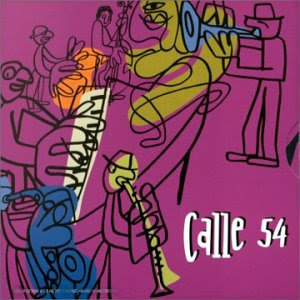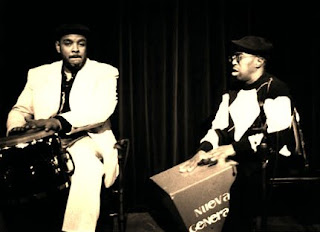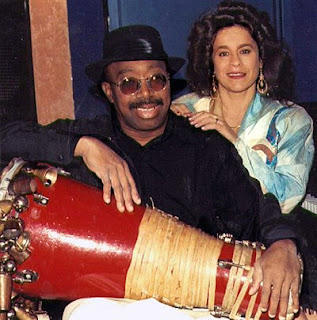
(Note: This article was written by Patrice Banchereau and originally appeared in French on his blog Echú Aye.)
Yesterday, Tuesday 12th of August 2008, at approximately 1:30 am, Orlando Ríos "Puntilla" passed away, due to a heart attack.
He had been under dialysis for several years. The viewing for Puntilla starts tomorrow (Thursday) at 4pm, at the Montero Funeral Home, 1848 Westchester Avenue in the Bronx.
(UPDATE: The Lincoln Center show scheduled for this Sunday, is ON.)
Born in Havana on December 26, 1947, Puntilla came to USA in 1981 with the Marielito wave, quickly changing the batá scene in New York single-handedly, becoming THE new influence for American bataleros.
He also was renowned as a great rumbero, and definitely astonished the USA with his interpretation of "Oferere" and "Arere" on the "Totico y sus Rumberos" (MONTUNO MCD 515) record in 1992, in which he was the musical director.
On the cover (below), Puntilla is the small man against the street lamp, looking frozen stiff, his hands in the pockets of his leather coat.
Here is the décima in "Arere":
Oye señores caramba,
le voy a hacer un relato
que por un río yo pasé
Parado allí yo me quedé
a contemplar el agua limpia
fresca y clara
Mi alma recocijada
una Santa me encontré
al verla yo me impresioné
Oye, que me dijo vacilante:
“camina muchacho un poco más pa’lante
y encontraras a Eleguá,
Santo que sin ninguna mata
te limpiará tu camino
Obatalá es tu camino,
oye, pues te cuida sin cesar
y te librará, muchacho
de toda tu males y manías
tu ves…
Omoni Alawana mama ke nya irawo, e…

Successfully leading many "tambores" in New York and East-coasts basements and private houses, right after arriving in the United Sates he started his own group, "Nueva Generación," which released a live album, "Spirit Rhythms" (LATITUDES LAT50603) in 1987. This cd is now completely out of print, even on the Latitudes website.
He then took part in Emilio Barretto's ambitious "Santísimo" project, with a boom-like first album.
Every director of every conjunto folklórico in Cuba still dreams of having such a marveolous sounding coro like the one on this wonderful cd.
Beside these choral miracles, it contains many vocal duets between Emilio Barretto, (many will find his non-traditional interpretations somewhat disturbing) and one Amelita Pedroso demonstrating all her skillful and mastered chanting.
Puntilla offers a wonderful iyesá to Iroko and Ochún - ¡sabrosísimo!:
"Kó kó kó Iroko mo iyesá
E bí abba uchiche Arabba
Arabba sise oguedde
E bí abba sise Arabba
Arabba sise oguedde
Iroko lo iyesá
Gba ilé kó kó kó"

(sleeve colors have been changed)
Santísimo's second album was a "tambor doble" recorded in ceremony conditions, with a quite bad (but much more authentic) sound:
Meanwhile, Puntilla recorded two cds with Deep Rumba (or "Rumba Profunda"), a kind of Latin Jazz All-stars:
- "Alto en la Fiebre de la Rumba" featuring Horacio "El Negro" Hernández, Robby Ameen, Xiomara Laugart, Andy González, Richie Flores, Paoli Mejías, Haila Monpié, Giovanni Hidalgo, Román Díaz and Pedrito Martínez
- "This Night Becomes a Rumba", featuring more or less the same musicians, plus Milton Cardona, Rubén Blades and Jerry González:


More recently, in the early 2000's, Puntilla renewed contacts with rumberos of Havana for two new albums featuring pure rumba:
The first one was a soundtrack for Marta Moreno Vega and Bobby Shepard's:
"Cuando los Espíritus Bailan Mambo":
Sadly this film now seems to be out of print…
In this double cd, four groups, plus a group of cuban rappers, "Anónimo Consejo":
-Los Egun Hablan (in fact part of Rumberos de Cuba).
-Grupo Yoruba Andabo
-Conjunto de Clave y Guaguancó
-El Conjunto Estrellas Cubanas, a famous charanga, playing "violín a los Orichas".



The second Havana rumba record, though recorded in 2003, was released in 2007, "A Tribute to Tío Tom." Once more, it features Rumberos de Cuba - with guests - under "Puntilla y el Conjunto Todo Rumbero" name (see article here).
You'll find most of the lyrics of this album on the Cancionero Rumbero blog.
You can listen to/or buy some tracks and download the inside booklet HERE.
The musicians with Puntilla are:
-Maximino Duquesne (tres-dos)
-Marquito Herminio Díaz (tumbador)
-Mario "Aspirina" Jáuregui (quinto)
-Ernesto Gatel (chant)
-Aidita (coro)
-Miguel Ángel Mesa
-El Goyo Hernández
-Lázaro Rizo
-Geovani del Pino
-Juan Cámpos Cárdenas "Chán"
-Miguel Chapottín Beltrán
(with Michele Rosewoman, as part of her "New Yor-Uba" ensemble)
Unfortunately, many health problems began to bring Puntilla down, at the beginning of the 2000's.
His wonderful energy of the past began to fade, little by little; his magnificent voice got damaged, so did his hearing. All his fans began to feel pain, knowing that his damaged health altered his singing, something which had never occurred before.
He went to Cuba many times to recover and get cured, and in January 2004 organized at his family home in Havana a great rumba. I was lucky enough to be there. In the main room, his friends could watch clips from "Cuando los Espíritus Bailan Mambo." Outside, El Negro Triana and Salazar never stopped singing. Chapottín, Ernesto Gatel, Chaguito, and some two dozen great rumberos were there.
Puntilla, who was wearing under his clothes an enormous bandage all around his belly did not sing, but before "despedir a todos," he began "Mi Arere" just outside the front door, and then asked Ernesto Gatel to follow with "El Trovador".
Listen here:

Puntilla's role in the rumbero and santero world has always been wide, but he also played a part on the Latin Jazz scene: when Fernando Trueda rented the Sony studios for his film "Calle 54," he called Puntilla for a rumba that was in everyone's head that year:
"Si a Compay Galletano ¿cómo sin diente wa a mole'?
Wai, wai, wai ilaso
Wai, wai, wai ilaso
Wai, wai, wai ilaso
Kó kó wa a mole"
There he gathered in the "Nueva Generación" none other than:
Patato Valdés, Andy González, Román Díaz and Pedrito Martínez.
I remember when the film went on French Canal+, watching the video tape dozens of times, always with the same thrill on my skin. At home, children used to sing all day long: "Ma ni Lodo, ma ikokó ka iña…"
Ibae ibae n'tonú Orlando Puntilla…
As an ending, here are some vids from YouTube. A thousand thanks to all who "posted" those.
In this last video, Amadito (Amado Dedeu's son), Ernesto Gatel (who always tells that Puntilla was his main inspiration) and Tata (Pedro Franscisco Almeida Berriel) are talking on the phone with Orlando… quite moving.






5 comments:
Greetings!
Much appreciation and thanks to you for taking the time to do such a magnificent tribute to Orlando "Puntilla" Rios, detailing some of his life work and contributions. He will be surely missed.
Ibae Padrino!
Love Always!
Antoinette
Alafia, Abure Guarachón!
Escuchando la grabación del rumbón en casa de puntilla se me caen las lagrimas de los ojos, muy emocionado viendo tu tributo. Muchas gracias por compartirlo con todos!
Bendiciones
Juan
much respect to the person that took the time to write this article. Puntilla was an inspirationto sooo many people during his time with us. I can still remember him making fun of himself wen i was growing up saying that one day he would have to look up to me and me down at him. He baptized me wen I was a baby and my dad is one of his very first ahijados in ocha. I remember him with great joy for all the good time we had and also with sadness wishing i could have spent more time with him and learned from him. he will be missed and remember forever. Te quiero, padrino.
much respect to the person that took the time to write this article. Puntilla was an inspirationto sooo many people during his time with us. I can still remember him making fun of himself wen i was growing up saying that one day he would have to look up to me and me down at him. He baptized me wen I was a baby and my dad is one of his very first ahijados in ocha. I remember him with great joy for all the good time we had and also with sadness wishing i could have spent more time with him and learned from him. he will be missed and remember forever. Te quiero, padrino.
Su nombre en el Santo era?
Post a Comment